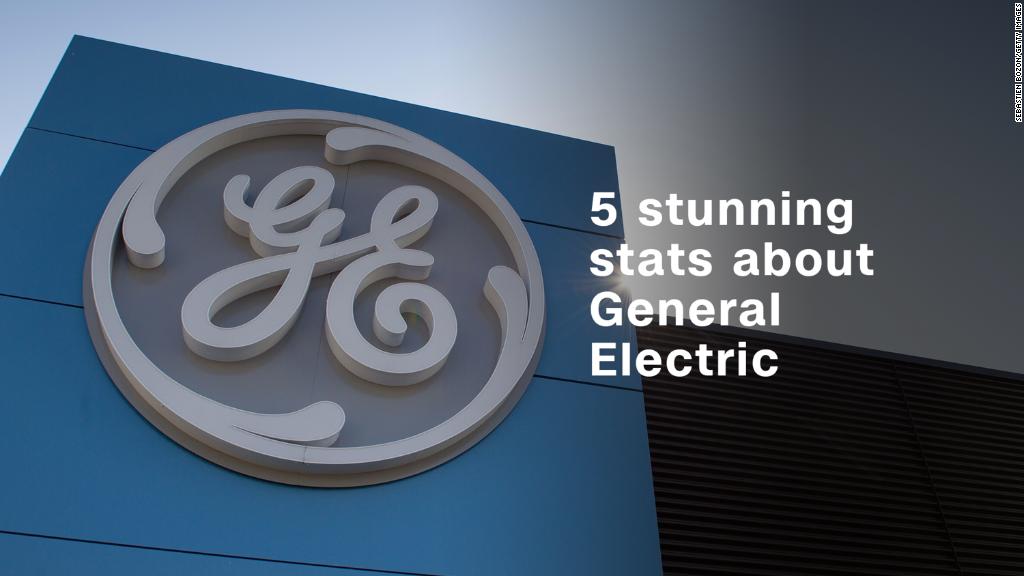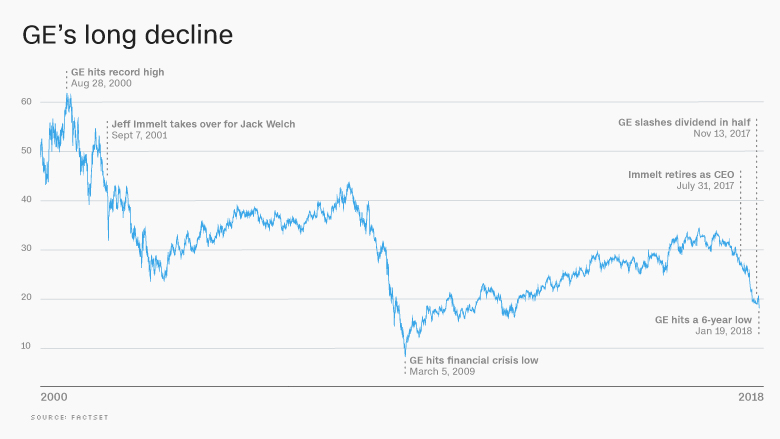
General Electric's 110-year run in the Dow could be nearing its end.
The company's unending list of problems led Deutsche Bank analyst John Inch to predict that GE is "likely to be dropped from the Dow."
Inch, a frequent critic of GE, appears to be the first major analyst to make such a call. In his report on Wednesday, he cited GE's "substantial challenges," including a serious cash crisis, badly slumping power division and efforts to dramatically shrink the sprawling conglomerate. There's also the SEC investigation that GE disclosed last week.
GE's (GE) cratering stock price, which is hovering near six-year lows, is another issue. While the Dow has soared 32% over the past year, GE has lost nearly half its value.
The committee that runs the Dow prefers to have no more than a 10-to-1 ratio between the high and low stock on the index. But the ratio between GE and Boeing (BA) is more than twice that today.
That's important because the Dow is weighted by its stock price. Most other market indexes are weighted by market cap. So a 1% move in a $350 stock like Boeing would move the Dow significantly more than a 1% move in $16 stock like GE.
No decisions about booting GE have been announced. It's possible that the committee in charge of the Dow's membership may opt to stick with GE.
A spokesman at S&P Global, which controls the Dow, declined to weigh in due to company policy. "We do not provide comment on potential adds or drops to our indices as we consider this information to be market moving and material," he said.

Related: GE is under SEC investigation
GE is an original member of the Dow, the index born in 1896 that is perhaps the most recognizable market metric in the world. But the company was removed and invited back several times, before returning in 1907 where it has remained ever since.
Despite GE's current crisis, there is a case to be made for keeping the stock in the Dow. While GE's stock price has cratered, it still boasts a very large market valuation of about $140 billion. That's bigger than seven Dow stocks, including McDonald's (MCD), Caterpillar (CAT), Nike (NKE) and American Express (AXP).
GE is also still a massive company, with its fingers in everything from aviation and power plants to healthcare and railroads. Corporate filings indicate GE employed about 295,000 people as of the end of 2016, though recent layoffs have reduced its headcount.
However, GE is in retreat mode. It long ago parted ways with NBC, Universal Studios and much of GE Capital. Now it's planning to jettison its light bulb and railroad divisions. GE is even considering an outright breakup of the company.
It's possible that GE may not be as representative of the broad American economy as it once was.
Consider that GE's stock is plunging even as the U.S. economy gathers momentum and rival industrial companies like Honeywell (HON), 3M (MMM) and United Technologies (UTX) are booming.
"It's a great time for industrials," said Cowen analyst Gautam Khanna. "The divergent performance for GE is simply egregious."
Related: GE's $31 billion pension nightmare
GE's downfall has been caused in large part by bad decisions under former CEO Jeff Immelt about where to deploy the company's cash. Some acquisitions, like the 2015 purchase of Alstom, have backfired badly. Instead of shoring up its underfunded pension, GE aggressively bought back stock and paid out a fat dividend that last year had to be halved.
Getting kicked out of the prestigious 30-stock index would be the cherry atop an embarrassment sundae.
If GE were kicked out of the Dow, there's no guarantee it would be replaced by another industrial company.
When AT&T (T) was removed from the Dow in 2015, it was substituted by Apple (AAPL). (AT&T has agreed to acquire CNN parent Time Warner). Honeywell (HON) and Altria (MO) were replaced in 2008 with Bank of America (BAC) and Chevron (CVX).
This time, a tech titan like Amazon (AMZN), Facebook (FB) and Google owner Alphabet (GOOGL) could be swapped in. Then again, Amazon and Alphabet sport stock prices above $1,100, making their inclusion potentially problematic.
--CNNMoney's Paul R. La Monica contributed to this report.


